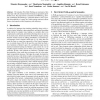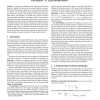118
Voted
ECAI
2010
Springer
15 years 3 months ago
2010
Springer
Non-standard reasoning in Description Logics (DLs) comprises computing a Least Common Subsumer (LCS), a Concept Difference, a Concept Unifier, or an Interpolant Concept, to name a ...
116
click to vote
ECAI
2010
Springer
15 years 3 months ago
2010
Springer
Over the past several decades, psycholinguists have gained countless insights into the process of child language acquisition. Can these findings be used for the development of lang...
130
Voted
ECAI
2010
Springer
15 years 3 months ago
2010
Springer
Trust and reputation measures are crucial in distributed open systems where agents need to decide whom or what to choose. Existing work has mainly focused on the reputation of sing...
132
Voted
ECAI
2010
Springer
15 years 3 months ago
2010
Springer
Abstract. Multi grain sentiment analysis is the task of simultaneously classifying sentiment expressed at different levels of granularity, as opposed to single level at a time. Mod...
146
Voted
ECAI
2010
Springer
15 years 3 months ago
2010
Springer
In this paper, we propose an automated approach to track and recognize daily activities. Any activity is represented in this research as a sequence of raw sensors data. These seque...
118
click to vote
ECAI
2010
Springer
15 years 3 months ago
2010
Springer
Abstract. Many works have identified the potential benefits of using argumentation to address a large variety of multiagent problems. In this paper we take this idea one step furth...
111
click to vote
ECAI
2010
Springer
15 years 3 months ago
2010
Springer
We introduce First Order ProbLog, an extension of first order logic with soft constraints where formulas are guarded by probabilistic facts. The paper defines a semantics for FOPro...
148
click to vote
ECAI
2010
Springer
15 years 3 months ago
2010
Springer
Abstract. Deep Neural Networks (DNN) propose a new and efficient ML architecture based on the layer-wise building of several representation layers. A critical issue for DNNs remain...
125
Voted
ECAI
2010
Springer
15 years 3 months ago
2010
Springer
In human-level simulations, like video games can be, the design of character's behaviors has an important impact on simulation realism. We propose to divide it into a reasonin...
131
click to vote
ECAI
2010
Springer
15 years 3 months ago
2010
Springer
Artificial agents trying to achieve communicative goals in situated interactions in the real-world need powerful computational systems for conceptualizing their environment. In ord...


